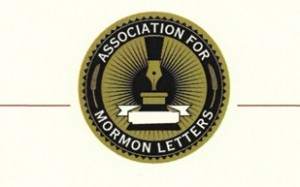 I submitted two proposals for this year’s AML Conference, both poetry-centered, of course. Here they are:
I submitted two proposals for this year’s AML Conference, both poetry-centered, of course. Here they are:
Proposal 1: Live Poetry Anthology: Mormon Poets Read (Two full sessions)
Based on the success of the two poetry reading panels I organized for last year’s AML Conference, I approached my poet friends to see if there was any interest in organizing more readings for this year’s conference. I have around twenty poets* who said, “Heck, yeah! We’d love to read at AML in 2013.” So this proposal is for two (2) sessions (preferably back-to-back sessions) filled with poetry read by a range of Mormon poets. Each session would include approximately ten poets reading for around five to six minutes each. Michael Hicks has called this event format “a live poetry anthology” because it allows space for many poets to voice their poems and shows how the community of poets so involved is a living community whose canon of texts is constantly expanding.
*As of right now, my list of definites includes the following: Alan Mitchell, Alex Caldiero, Amber Ellis, Brian Brown, Doug Talley, Elaine Craig, Elizabeth Pinborough, Jim Richards, Jonathon Penny, Laura Baxter, Laura Stott, Lisa Fillerup, Mark Bennion, Michael Hicks, N. Colwell Snell, Rachel Noorda, Sarah Duffy, Sarah Jenkins, Susan Howe, and Terresa Wellborn.
Proposal 2: Performative Poesis and the (Un)Making of the World
In the days following the tragedy at Sandy Hook Elementary in Connecticut, I came across or remembered several texts that were composed in response to this event and to other violent events in contemporary America, including 9/11 and the 2007 Virginia Tech shooting. The first text I encountered was an article published by The Onion, satirical online news rag, the day of the Sandy Hook shooting. The article, “F*** Everything, Nation Reports,” is short—it comes in at only 456 words. But as the title suggests, its language is potent: of the many profanities included, 16 are the f-word. The second text was a poem called “In the Loop” by Bob Hicok, who explores with the poem a response many people had to the Virginia Tech shooting: to say “how horrible it was, how little / there was to say about how horrible it was.” The third was Alex Caldiero’s “Poetry is Wanted Here!,” a poem dedicated to his friend “Bob Heman, in New York, Oct. 2001 re. 9/11.” And the fourth was a poem by Shane Koyczan: “People are Getting Better.” Unlike the other three texts, Koyczan’s poem isn’t a response to a specific event; but it does reference “kids who turned their school into a shooting range,” kids who “play Russian Roulette with guns . . . they found on their playground,” and “airlines [that] plummet from the skies.”
Beyond similarities in subject matter—all reference violent events that have received national, even global, attention—the one thing that connects these texts in my mind is the way each shows how four very different writers turned to words in response to violence as a way to mediate the ongoing effects of violence. These movements toward language in the face of destruction jibe with the understanding I’ve developed as a Latter-day Saint that words are an act of faith and have a profound, creative influence on the world. As noted in the Lectures on Faith, faith works by words; indeed, faith’s mightiest works have been and will be performed with words. These works, of course, include God’s eternal performance as World-Maker (his poesis), which proceeds through his Word, who is Christ. Through personal and scholarly reflections on the texts cited above, this paper explores my LDS-informed view of words and the Word, especially in terms of how we mirror the World-Makers’ creative performance in our own word-making.
(Also posted here.)

Pingback: Public Uses of Poetry: Two AML Proposals | A Motley Vision
So awesome. I wish I could be there, but alas, it doesn’t look like it will happen this year. I hope you’ll publish your paper online, Tyler, so I can read it. I wrote a few poems in response to Sandy Hook, and I would be very interested to read your thoughts in regards to Proposal 2.